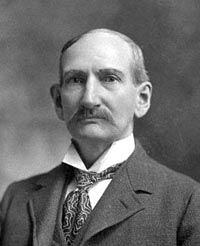In Virginia the forces of Union General Philip Sheridan maintain pursuit of Confederate General Jubal Early‘s forces, albeit at a slow enough pace to allow ample time to burn crops, barns, forage and whatever else they think would have been useful to the Confederacy.
Meanwhile, forces under the command of Confederate General Nathan Bedford Forrest provide a glimmer of hope for the South by defeating Union forces stationed in Athens, Alabama and at Fort Henderson. On the morrow, Forrest’s men best Union reinforcements, bringing an end to the bloodiest battle in north Alabama during the war.
Forrest’s victory and destruction of a rail trestle critical to Union supply efforts in the Deep South hamper regional Federal supply efforts, but have no bearing on the war at large.
Also this day, far westward a former Baptist Sunday School teacher is involved in a skirmish in the Union-occupied town of Fayette, Missouri. It is a minor engagement, but two participants are destined to become famous.
Fighting for the Confederacy as a “bushwhacker” (or guerrilla), Frank James, the Sunday school teacher, along with brother Jesse James survives an intense gunfight. Frank later recalls the skirmish.
“We charged up to a blockhouse made of railroad ties filled with port holes and then charged back again. The blockhouse was filled with Federal troops and it was like charging a stone wall only this stone wall belched forth lead. I was mightily scared. It was the worst fight I ever had.”
Frank and Jesse James are the sons of a Baptist minister, Robert James, deceased by the war. Robert was a co-founder of Missouri Baptists’ William Jewel College. The James brothers remain devout Baptists during their guerrilla activity of the Civil War years and beyond.
Following the war Jesse tries to surrender to Union forces at Lexington, Missouri, but in a shoot out is badly wounded and escapes. Near death for several months, Jesse survives, his hatred of the Union all the greater.
Frank, meanwhile, surrenders in July and is pardoned.
In late 1865 Jesse and Frank are at home in Kearney, Missouri. While Jesse continues regaining strength, he sings in the choir of the Mt. Olive Baptist Church in Kearney. According to some accounts, Jesse, out of religious conviction, was never known to use foul language.
The James’ brothers and other bushwhackers in 1866 begin robbing banks in retribution for the Union’s victory during the war and in an attempt to help restore the racial social order of pre-war days. Their first robbery is February 13, 1866 in Liberty, Missouri, the first bank robbery in American history in broad daylight during peacetime. Jesse helps plan but is not a part of the robbery, having not yet regained enough strength to participate. More robberies follow, with Jesse involved.
In June 1866 Frank, while traveling to Kentucky to visit a relative, is involved in a shootout with four Union soldiers. Killing two, a wounded Frank continues to Kentucky, where he rests up.
Thus is the beginning of what becomes known as the James’ Gang. Evading capture for many years in the midst of a growing litany of outlaw exploits, for several years the two brothers, under assumed names, settle down and try to live normal lives. Yet by 1881, they are back on the outlaw trail.
Such a life could not continue indefinitely. With a bounty of $10,000 on his head, Jesse is killed in 1882, murdered by a friend. The First Baptist Church, of which Jesse was a member, refuses to host the funeral, fearing the publicity.
The James’ Gang disbands upon Jesse’s death, and Frank surrenders to authorities. Arrested and tried, Frank is acquitted and moves to Oklahoma with his mother.
In the decades to come Frank lives a law-abiding life, holding down a variety of jobs, his notoriety following him. Eventually moving back to Missouri, in his final years he lives on the James’ farm and gives tours for 25 cents.
Frank James dies in 1915.
Sources: “Battle of Sulphur Creek Trestle” (link) and (link); “Battle of Fayette,” Missouri Civil War Sesquicentennial (link); “The Life and Times of Jesse James,” Public Broadcasting Corporation (link); “Kearney History,” Jesse James Festival (link); “The Saga of Dingus & Buck, The Beginning of the Legend of Frank and Jesse James” (link); see also Ted P. Yeatman, Frank and Jesse James: The Story Behind the Legend, Nashville: Cumberland House Publishing, 2000 (link); “Frank James,” Wikipedia (link); “Frank James,” History Net (link)




